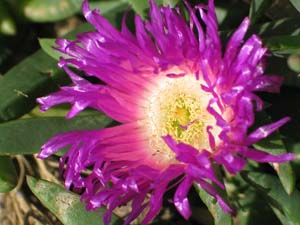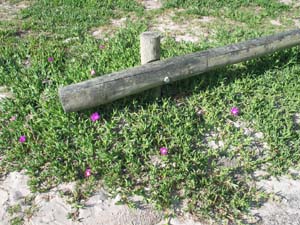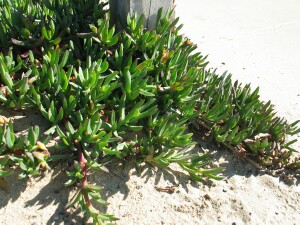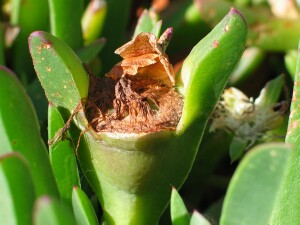Karkalla
Back | Salinity Indicator Plants Home | Common name home | Scientific name home | Photo Gallery | Glossary
| Karkalla photos |
| Scientific Name: | Carpobrotus rossii |  Karkalla - flower Photo: A J Brown | ||||||
Other Common Name: | Native Pigface | |||||||
Status: | Native to Australia. | |||||||
Plant Description: | Perennial succulent with trailing stems to 1 m long or more, which often root at the nodes. Leaves opposite, 3.5-10 cm long and 6-11 mm thick, often incurved, green to glaucous (blue-green with a whitish bloom), smooth and triangular with more or less flat (slightly concave) faces and sharp angles. Flowers 3.5-5.5 cm diameter when open and of numerous linear petals (actually sterile stamens) which are light purple, merging to white at their bases. The fruit is fig-like, fleshy and indehiscent, slightly flattened and globular to ellipsoid in shape, 1.5-2.5 cm long and dull red in colour. Flowers in spring and summer. | |||||||
Habitat: | Common on sand dunes and cliffs along the Victorian, South Australian and Tasmanian coastlines but also on sandy soils around coastal lakes and marshes. Occasionally found slightly inland.
| |||||||
Comments: | Drought and somewhat frost resistant. Will withstand strong winds, salt spray and sand blasting. This tough plant will grow up through sand drifts, even if completely covered. Can be useful in preventing dune erosion. Both the fruit and leaves were used as a food source by indigenous Australians. Similar to other Pigfaces (see Key to Pigfaces and similar plants). Particularly similar to Carpobrotus glaucescens which only grows in coastal far-east Gippsland. May be confused with Rounded Noon-flower (Disphyma crassifolium subsp. clavellatum) which can grow in the same habitats, but the leaves of the Noon-flower have rounded angles. A long-leaved Pigface from far north-west Victoria is thought to be either a new undescribed species, a polyploid race of Inland Pigface (Carpobrotus modestus) or a hybrid between other Pigface species. It is most similar to Karkalla and is currently known as Carpobrotus aff. rossii. | |||||||
 Karkalla - matted groundcover Photo: A J Brown |  Karkalla - leaves Photo: A J Brown |
|  Creeping stems and leaves of Karkalla Photo: A J Brown |
 Flower and leaves of Karkalla Photo: A J Brown |  Ripening fruit of Karkalla Photo: A J Brown |
 Fruit of Karkalla Photo: A J Brown |



